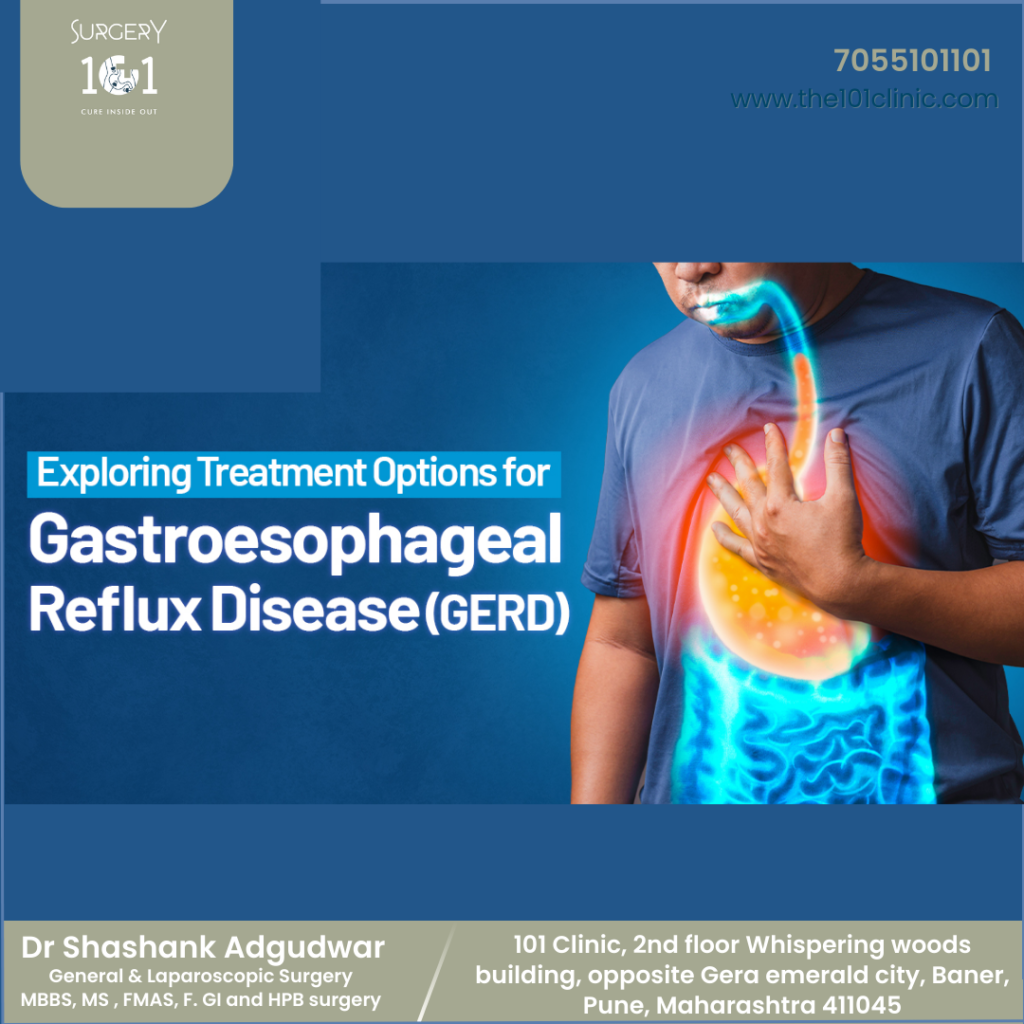Gastroesophageal Reflux Disease (GERD) is a common yet often overlooked digestive condition that can significantly affect quality of life. Characterized by the backflow of stomach acid into the esophagus, GERD often presents symptoms such as persistent heartburn, acid reflux, chest pain, and difficulty swallowing. If left untreated, it can lead to complications like esophagitis, esophageal stricture, or Barrett’s esophagus, which may increase the risk of esophageal cancer. Fortunately, effective treatment options are available. In Baner, Pune, Dr. Shashank Shrikant Adgudwar, a highly experienced gastrointestinal surgeon at The 101 Clinic, specializes in providing comprehensive care for GERD and other reflux diseases. Let’s delve into the various treatment options available and when to consider them.
Understanding GERD: Causes and Symptoms
GERD occurs when the lower esophageal sphincter (LES) – the valve that prevents stomach contents from flowing back into the esophagus – becomes weak or relaxes inappropriately. Factors contributing to this include obesity, pregnancy, smoking, certain medications, and dietary habits. Common symptoms of GERD include:
- Persistent heartburn (a burning sensation in the chest)
- Acid regurgitation
- Difficulty swallowing (dysphagia)
- Sore throat or chronic cough
- Hoarseness or voice changes
- A sensation of a lump in the throat
These symptoms may vary in severity and can affect daily life, making early diagnosis and intervention crucial.
Lifestyle and Dietary Modifications
For patients experiencing mild GERD symptoms, lifestyle and dietary changes are often the first line of defense. Dr. Shashank Shrikant Adgudwar recommends the following modifications to help reduce acid reflux and manage GERD symptoms:
- Weight Management: Losing excess weight can relieve pressure on the stomach and reduce reflux.
- Dietary Adjustments: Avoid trigger foods such as spicy dishes, acidic fruits, caffeine, chocolate, and fatty meals.
- Eating Habits: Eat smaller, more frequent meals, and avoid eating close to bedtime.
- Avoid Alcohol and Smoking: Both can weaken the LES and aggravate symptoms.
- Elevate the Head of the Bed: Sleeping with the head elevated can prevent nighttime reflux.
While these changes can help control symptoms, they may not be sufficient for all patients, especially those with moderate to severe GERD.
Medical Management
When lifestyle modifications are not enough, medication is typically the next step. Dr. Adgudwar may prescribe the following:
- Antacids: Neutralize stomach acid and provide quick relief for mild symptoms.
- H2 Receptor Blockers: Reduce acid production and provide longer-lasting relief.
- Proton Pump Inhibitors (PPIs): Decrease acid production more effectively, promoting healing of the esophageal lining.
- Prokinetics: Improve esophageal motility and stomach emptying.
Medications are often effective in controlling symptoms and preventing complications, but long-term use may carry risks and side effects. Therefore, patients not responding to medication may need to consider surgical intervention.
Surgical Options for GERD
For patients with severe GERD or complications like Barrett’s esophagus or esophageal strictures, surgical treatment may be necessary. At The 101 Clinic, Dr. Shashank Shrikant Adgudwar offers advanced surgical options to treat GERD and other reflux diseases:
- Laparoscopic Nissen Fundoplication: This is the most common surgical procedure for GERD, where the upper part of the stomach is wrapped around the LES to strengthen it and prevent acid reflux. It is minimally invasive, offers faster recovery, and provides long-term relief from GERD symptoms.
- LINX Device: A ring of magnetic beads is placed around the LES to reinforce its closure, allowing food to pass through while preventing reflux. This procedure is less invasive and can be effective for patients who wish to avoid fundoplication.
- Endoscopic Procedures: Techniques such as endoscopic fundoplication or Stretta therapy are less invasive and use endoscopic tools to tighten the LES.
Each of these options has its own benefits and potential risks, and the choice of procedure is tailored to the patient’s specific condition, health status, and preferences.
Choosing the Right Treatment: Consult with Dr. Shashank Shrikant Adgudwar
Finding the right treatment for GERD requires a thorough evaluation by a skilled specialist. Dr. Shashank Shrikant Adgudwar at The 101 Clinic in Baner takes a patient-centered approach, offering personalized treatment plans based on the severity of the disease, the presence of complications, and the patient’s overall health. With his expertise in advanced laparoscopic and endoscopic procedures, Dr. Adgudwar ensures that each patient receives the highest quality of care and the most effective treatment to manage GERD and related conditions.
Get Relief from GERD in Baner
Living with GERD can be challenging, but it’s important to remember that effective treatments are available. Whether you are experiencing mild symptoms or struggling with severe acid reflux, Dr. Shashank Shrikant Adgudwar and his team at The 101 Clinic are here to help. With a range of treatment options, from lifestyle modifications to advanced surgical procedures, you can find relief and improve your quality of life.
Contact The 101 Clinic in Baner today to schedule a consultation and explore your options for comprehensive GERD treatment.

